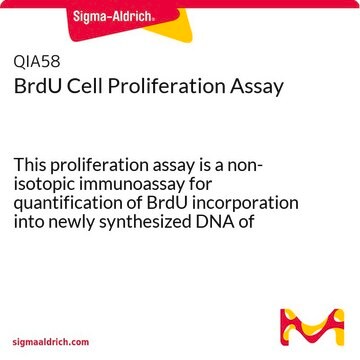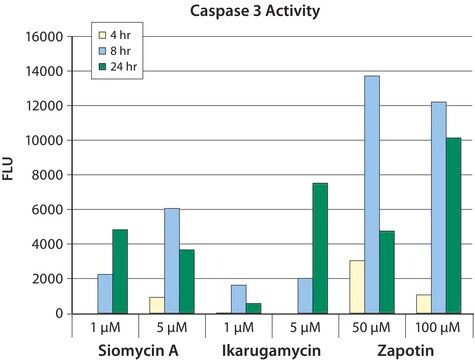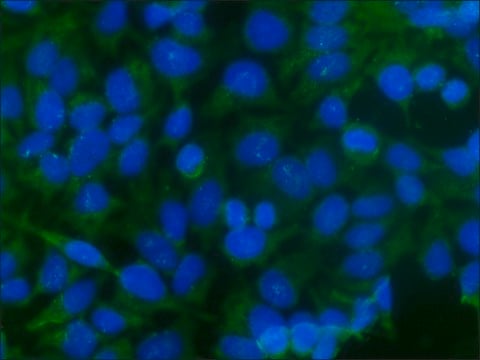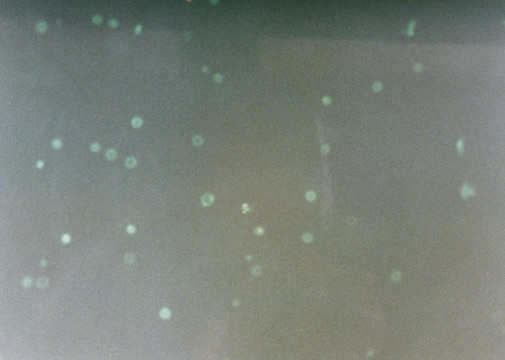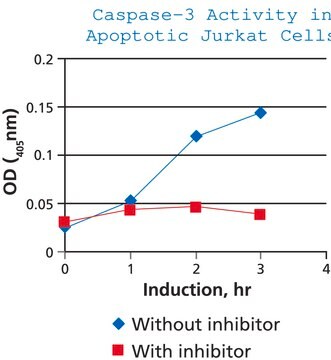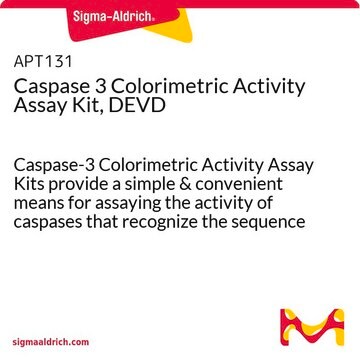APT173
Caspase 9 Colorimetric Activity Assay Kit, LEHD
Caspase-9 Colorimetric Activity Assay Kits provide a simple & convenient means for assaying the activity of caspases that recognize the LEHD.
Synonym(s):
Mch-6, ICE-LAP6, Apaf-3
Sign Into View Organizational & Contract Pricing
All Photos(1)
About This Item
UNSPSC Code:
12161503
eCl@ss:
32161000
NACRES:
NA.84
Recommended Products
Quality Level
species reactivity (predicted by homology)
mammals
manufacturer/tradename
Chemicon®
technique(s)
activity assay: suitable
NCBI accession no.
UniProt accession no.
detection method
colorimetric
shipped in
dry ice
Gene Information
human ... CASP9(842)
General description
Activation of ICE-family proteases/caspases initiates apoptosis in mammalian cells. Chemicon′s Caspase-9 Colorimetric Activity Assay Kits provide a simple and convenient means for assaying the activity of caspases that recognize the LEHD. The assay is based on spectophotometric detection of the chromophore p-nitroaniline (pNA) after cleavage from the labeled substrate LEHD-pNA. The free pNA can be quantified using a spectrophotometer or a microtiter plate reader at 405 nm. Comparison of the absorbance of pNA from an apoptotic sample with an uninduced control allows determination of the fold increase in caspase-9 activity.
Application
Caspase-9 Colorimetric Activity Assay Kits provide a simple & convenient means for assaying the activity of caspases that recognize the LEHD.
Research Category
Apoptosis & Cancer
Apoptosis & Cancer
Components
5X Cell Lysis Buffer (Part No. 90065): 5 mL
5X Assay Buffer (Part No. 90066): 10 mL
Caspase-9 Substrate (Ac-LEHD-pNA) (Part No. 90084): 1 mL of 3 mg/mL solution
Caspase-9 Inhibitor (Ac-LEHD-CHO) (Part No. 90087): 50 μL of 100 μM (0.054 mg/mL) in DMSO
pNA Standard (Part No. 90085): 250 μL of 10 mM in DMSO
5X Assay Buffer (Part No. 90066): 10 mL
Caspase-9 Substrate (Ac-LEHD-pNA) (Part No. 90084): 1 mL of 3 mg/mL solution
Caspase-9 Inhibitor (Ac-LEHD-CHO) (Part No. 90087): 50 μL of 100 μM (0.054 mg/mL) in DMSO
pNA Standard (Part No. 90085): 250 μL of 10 mM in DMSO
Storage and Stability
Store kit materials at -20°C up to their expiration date.
Special Precautions:
· After thawing reagents, use immediately or aliquot and freeze at -20°C for longer storage. Avoid repeated freeze/thaw cycles.
· The Caspase-9 substrate and pNA standard are especially light sensitive. Maintain these reagents in amber or covered containers.
Special Precautions:
· After thawing reagents, use immediately or aliquot and freeze at -20°C for longer storage. Avoid repeated freeze/thaw cycles.
· The Caspase-9 substrate and pNA standard are especially light sensitive. Maintain these reagents in amber or covered containers.
Legal Information
CHEMICON is a registered trademark of Merck KGaA, Darmstadt, Germany
Disclaimer
Unless otherwise stated in our catalog or other company documentation accompanying the product(s), our products are intended for research use only and are not to be used for any other purpose, which includes but is not limited to, unauthorized commercial uses, in vitro diagnostic uses, ex vivo or in vivo therapeutic uses or any type of consumption or application to humans or animals.
Storage Class Code
10 - Combustible liquids
Certificates of Analysis (COA)
Search for Certificates of Analysis (COA) by entering the products Lot/Batch Number. Lot and Batch Numbers can be found on a product’s label following the words ‘Lot’ or ‘Batch’.
Already Own This Product?
Find documentation for the products that you have recently purchased in the Document Library.
Customers Also Viewed
Dimosthenis Mantopoulos et al.
PloS one, 6(9), e24245-e24245 (2011-10-01)
Detachment of photoreceptors from the underlying retinal pigment epithelium is seen in various retinal disorders such as retinal detachment and age-related macular degeneration and leads to loss of photoreceptors and vision. Pharmacologic inhibition of photoreceptor cell death may prevent this
Ahmed Al Saqr et al.
Life (Basel, Switzerland), 12(1) (2022-01-22)
Furanodienone (FDN), a major bioactive component of sesquiterpenes produced from Rhizoma Curcumae, has been repeatedly acknowledged for its intrinsic anticancer efficacy against different types of cancer. In this study, we aimed to investigate the cytotoxic potential of furanodienone against human
Jean F Soustiel et al.
Experimental neurology, 214(2), 201-208 (2008-09-16)
The 18 kDa translocator protein (TSPO) is a protein complex located at the outer mitochondrial membrane and interacting with the mitochondrial permeability transition pore (mPTP), indicating its involvement in the control of mPTP opening. We intended to explore the effect
Mi In Roh et al.
Investigative ophthalmology & visual science, 52(6), 3825-3831 (2011-02-12)
To investigate whether edaravone (3-methyl-1-phenyl-2-pyrazolin-5-one), a free radical scavenger, would be neuroprotective against photoreceptor cell death in a rat model of retinal detachment (RD). RD was induced in adult Brown Norway rats by subretinal injection of sodium hyaluronate. Edaravone (3
Andrew J Tsung et al.
Oncotarget, 8(27), 44398-44409 (2017-06-03)
Glioblastoma (GBM) remains one of the most lethal and difficult-to-treat cancers of the central nervous system. The poor prognosis in GBM patients is due in part to its resistance to available treatments, which calls for identifying novel molecular therapeutic targets.
Our team of scientists has experience in all areas of research including Life Science, Material Science, Chemical Synthesis, Chromatography, Analytical and many others.
Contact Technical Service
